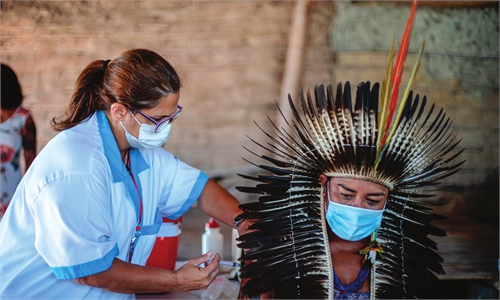A highly contagious variant of COVID-19 first identified in Britain does not cause more severe disease in hospitalized patients, according to a new study published in The Lancet Infectious Diseases medical journal on Monday.

The study analyzed a group of 496 COVID-19 patients who were admitted to British hospitals in November and December 2020, comparing outcomes in patients infected with B.1.1.7 or other variants.
The researchers found no difference in risks of severe disease, death, or other clinical outcomes in patients with B.1.1.7 and other variants.
"Our data, within the context and limitations of a real-world study, provide initial reassurance that severity in hospitalized patients with B.1.1.7 is not markedly different from severity in those without," the researchers said in the study.
A separate study published in The Lancet Public Health medical journal found that vaccines were likely to be effective against the variant in Britain since there was no apparent increase in reinfection rate when compared to variants identified in other countries.
According to British scientists, the variant in Britain was about 40-70 percent more transmissible than previously dominant variants.
The studies also confirmed the previous findings that B.1.1.7 was more transmissible.
However, they said the Lancet study had the benefit of having used whole-genome sequencing as well as a good variety of patient and disease outcomes.

A quarantining passenger holds up a sign reading " We don't have COVID-19!" after having to isolate for 10 days at the Radisson Blu hotel on February 16, 2021 in London, the UK. Photo: VCG
The strain, known as B.1.1.7, was identified in Britain in late 2020 and has become the most common strain in the US, according to the United States Centers for Disease Control and Prevention.The study analyzed a group of 496 COVID-19 patients who were admitted to British hospitals in November and December 2020, comparing outcomes in patients infected with B.1.1.7 or other variants.
The researchers found no difference in risks of severe disease, death, or other clinical outcomes in patients with B.1.1.7 and other variants.
"Our data, within the context and limitations of a real-world study, provide initial reassurance that severity in hospitalized patients with B.1.1.7 is not markedly different from severity in those without," the researchers said in the study.
A separate study published in The Lancet Public Health medical journal found that vaccines were likely to be effective against the variant in Britain since there was no apparent increase in reinfection rate when compared to variants identified in other countries.
According to British scientists, the variant in Britain was about 40-70 percent more transmissible than previously dominant variants.
The studies also confirmed the previous findings that B.1.1.7 was more transmissible.
However, they said the Lancet study had the benefit of having used whole-genome sequencing as well as a good variety of patient and disease outcomes.



